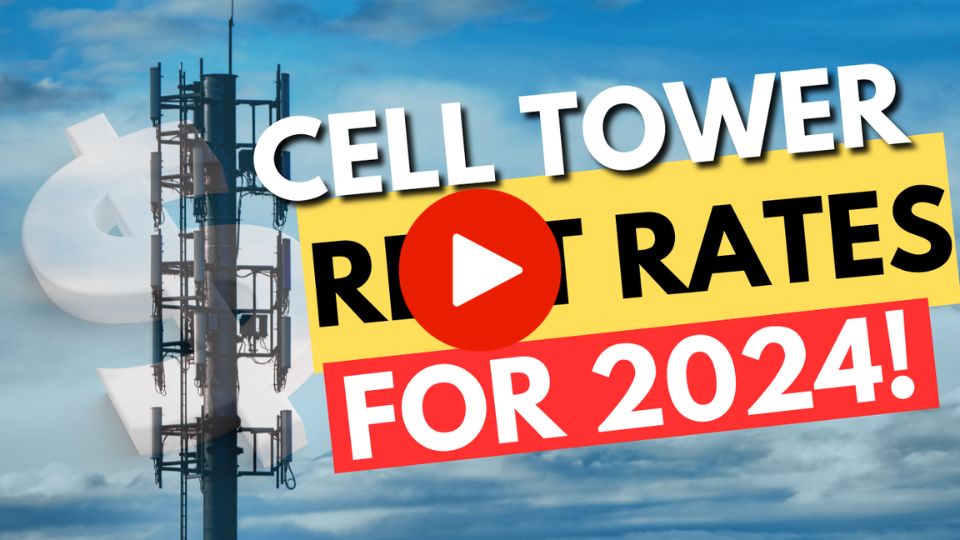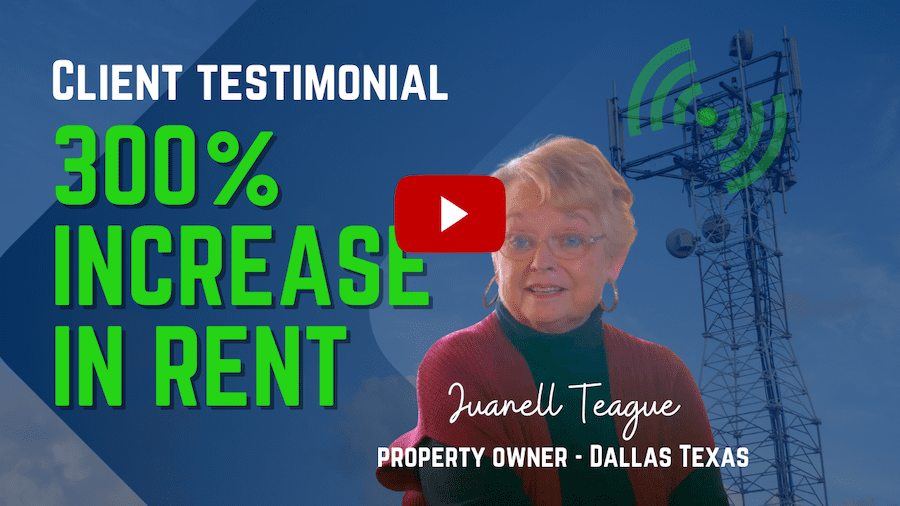The 5 Pros
1. Ancillary Revenue: The most self-evident benefit of having a cell tower lease is the additional ancillary revenue you receive from otherwise unused areas on your commercial, agricultural or industrial property. An average cell tower lease initially provides somewhere between $900 – $1,100 per month, escalating at a rate of between 2 – 3% per year. With the average cell tower lease having a scheduled term of 25 – 30 years, a cell tower lease landlord could garner more than $650,000 over the life of the lease.
2. Grade “A” Tenants: Most property owners who are approached to enter into a cell tower lease are being asked to enter into an agreement with Grade “A” tenants, such as AT&T, Verizon, T-Mobile, Crown Castle and American Tower. These afore-mentioned companies are worth tens of billions of dollars, generating billions of dollars of annual revenue, having impressive credit ratings and are part of a recession-proof industry. Simply stated, telecom companies are solid tenants.
3. Maximum Value Use: One of the primary appeals to leasing space for either a cell tower site or for rooftop antennas is that the space that is being used has limited or no other practical uses for the property owner. Commonly, a cell tower lease will require between 1,500 to 5,000 square feet for the placement of the cell tower, and a rooftop site will only require between 50 to 150 square feet and, based upon traditional square footage rates for similar areas on the property, a cell site can be the maximum value use for such space.
4. Maintenance Fee Tenancy: Traditionally, most landlords, whether they are commercial or residential, have several maintenance, repair and management expenses associated with leasing space. In contrast, a cell site lease has almost no maintenance obligations levied upon the property owner, with the tenant having the obligations regarding the maintenance, repair and compliance of the areas they occupy and use.
5. Dividend Appreciating Asset: Unlike most other real estate leases, there is a built-in market for the purchase of revenues being produced from cell site agreements. Either the cell tower company itself or third party companies that specialize in purchasing cell tower leases are buyers. The amounts paid for cell tower agreements are based upon rents being paid, escalators of rent structured in the cell tower lease and the remaining term of the lease. That being said, a cell tower lease can be compared to an asset that pays you an annual dividend (that dividend being the rents) with the underlying asset, the lease, increasing in value each year.
The 5 Cons
1. Long Term Commitment: The typical cell tower lease has, at minimum, a term of 20 years and some run up to 100 years. Furthermore, commonly the only way a property owner can terminate these agreements is by way of the tenant defaulting on the lease either by not paying rent or some other breach of the lease terms. As a result, it is more important for the property owner to get it right versus the cell tower company, as the property owner has a limited way to exodus the agreement, unlike the cell tower company that can do so at basically any time.
2. Health & Aesthetic Concerns: One of the primary questions that property owners have about having a cell tower or rooftop antennas on their property is “are cell towers safe?” Some property owners will not move forward with a cell site no matter the rent being offered due to health concerns. In addition, most cell towers do not improve the aesthetic quality of a property or the surrounding ones.
3. Development Restrictions: Many property owners are lured into the belief that a cell tower site is only impacting the area upon which the cell tower is located. In fact, a property owner is not only granting the rights for a cell tower company to occupy/use a particular defined area of their property, but is also placing restrictions on the rest of their land. These restrictions can result in hurdles that limit or fully restrict the future
development of their overall property resulting in a decrease in the overall value of your property.
4. Unforeseen Liabilities: Property owners sometimes do not realize the scope of possible liabilities that may exist if the property owner, its tenant, or contractors cause damage to the tower site. A standard cell tower lease does not limit the amount that a property owner would be responsible for if it causes an interruption in the operation of a cell site. This means that a property owner could not only be responsible for direct damages a cell tower company incurs, but all indirect or consequential damages that result from the site not being fully operational, which could mean tens to hundreds of thousands of dollars in exposure.
5. Unexpected Costs: While a property owner may have very limited or no maintenance obligations related to the actual tower, there may be some other unexpected costs that the property owner needs to account for when entering into a cell tower agreement. Property owners should protect themselves from certain expenses, such as tax liabilities, that may not exist when the cell tower is built on your property, but could come in the years ahead with future tax assessments that could be enacted by a municipality. Furthermore, property owners need to be aware of possible future increases in property owner insurance due to the construction of a cell tower on their property by making sure that their cell tower agreement accounts for this additional expense.




